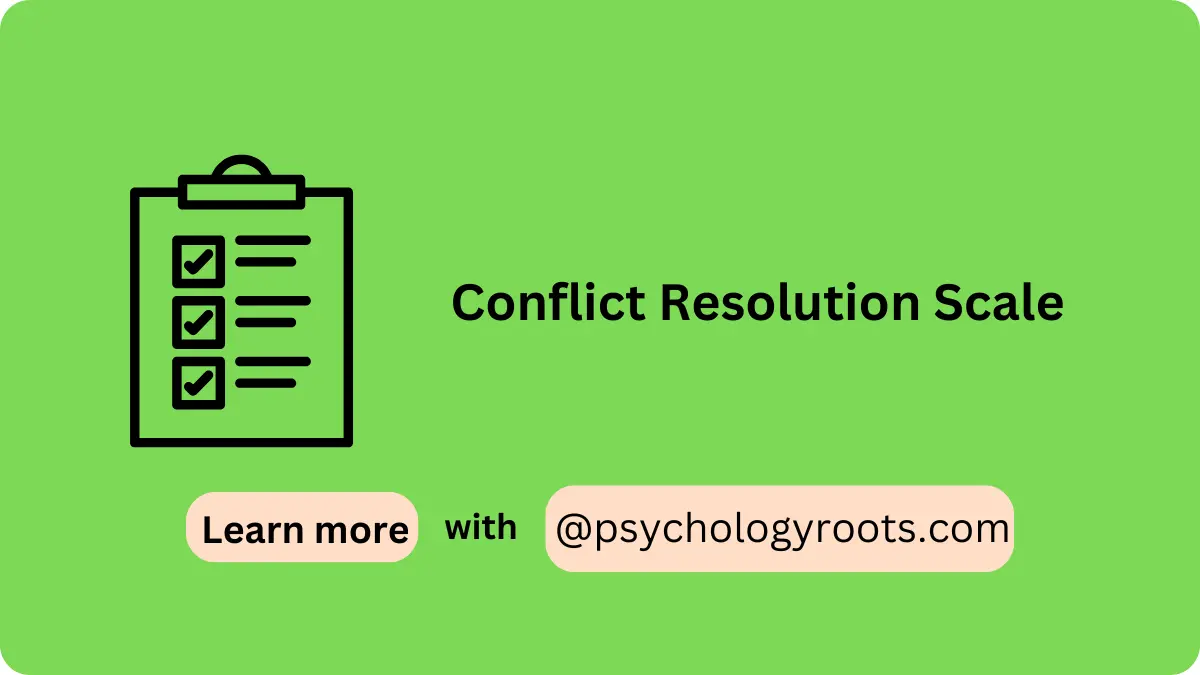Table of Contents
Conflict Resolution Scale
Here in this post, we are sharing the “Conflict Resolution Scale”. You can read psychometric and Author information. We have thousands of Scales and questionnaires in our collection (See Scales and Questionnaires). You can demand us any scale and questionnaires related to psychology through our community, and we will provide you with a short time. Keep visiting Psychology Roots.
About Conflict Resolution Scale
Scale Name
Conflict Resolution Scale (Part of the Individuals Protective Factors Index)
Author Details
Phillips and Springer, 1992
Translation Availability
English

Background/Description
The Conflict Resolution Scale evaluates an individual’s ability to manage and resolve conflict positively. It emphasizes two key skills: self-control and cooperation. By assessing these dimensions, the scale provides insight into a person’s capacity to approach interpersonal conflicts constructively, fostering harmonious relationships and personal growth.
This scale is specifically designed for adolescents aged 14–18 years (Grades 8–12), with two subscales focusing on cooperation and self-control. Each subscale contains six items, offering a comprehensive perspective on conflict resolution capabilities. The scale is part of the Individuals Protective Factors Index, underscoring its role in identifying protective factors that support youth resilience.
Administration, Scoring and Interpretation
- Target Population: Adolescents aged 14–18 years (Grades 8–12).
- Format: Self-report questionnaire with two subscales (Cooperation and Self-Control), each containing six items.
- Instructions:
- Clearly explain the response format before administering the scale:
- YES! = 4
- yes = 3
- no = 2
- NO! = 1
- Emphasize that YES! and NO! indicate strong agreement/disagreement, while yes and no represent milder responses.
- Instruct respondents to select the answer that best reflects how much the statement describes them.
- Ensure clarity on the need for reverse coding on the Self-Control subscale.
- Clearly explain the response format before administering the scale:
- Scoring:
Reliability and Validity
- Reliability:
- Cooperation subscale: Alpha = 0.70
- Self-Control subscale: Alpha = 0.68 (Pierce & Shields, 1998).
- Validity: The scale’s reliability and inclusion in the Individuals Protective Factors Index underscore its effectiveness in measuring conflict resolution skills in adolescents.
Available Versions
06-Items
Reference
Phillips, J., & Springer F. (1992). Extended National Youth Sports Program 1991–92 evaluation highlights, Part two: Individual Protective Factors Index (IPFI) and risk assessment study. Unpublished report prepared for the National Collegiate Athletic Association, Sacramento, CA: EMT Associates. Retrieved from http://emt.org/userfiles/ipfi.pdf. September 2004.
Important Link
Scale File:
Frequently Asked Questions
Q1: What does the Conflict Resolution Scale measure?
It assesses adolescents’ abilities to manage and resolve conflicts positively, focusing on self-control and cooperation.
Q2: Who is the target audience for this scale?
Adolescents aged 14–18 years, typically in Grades 8–12.
Q3: How is the scale scored?
Responses are scored on a 4-point scale, ranging from YES! = 4 to NO! = 1, with reverse coding applied to all self-control items. Total scores reflect the strength of conflict resolution skills.
Q4: Is permission required to use this scale?
No, permission is not needed to use this scale.
Q5: What are the subscales of the Conflict Resolution Scale?
The two subscales are Cooperation and Self-Control, each containing six items.
Disclaimer
Please note that Psychology Roots does not have the right to grant permission for the use of any psychological scales or assessments listed on its website. To use any scale or assessment, you must obtain permission directly from the author or translator of the tool. Psychology Roots provides information about various tools and their administration procedures, but it is your responsibility to obtain proper permissions before using any scale or assessment. If you need further information about an author’s contact details, please submit a query to the Psychology Roots team.
Help Us Improve This Article
Have you discovered an inaccuracy? We put out great effort to give accurate and scientifically trustworthy information to our readers. Please notify us if you discover any typographical or grammatical errors.
Make a comment. We acknowledge and appreciate your efforts.
Share With Us
If you have any scale or any material related to psychology kindly share it with us at psychologyroots@gmail.com. We help others on behalf of you.